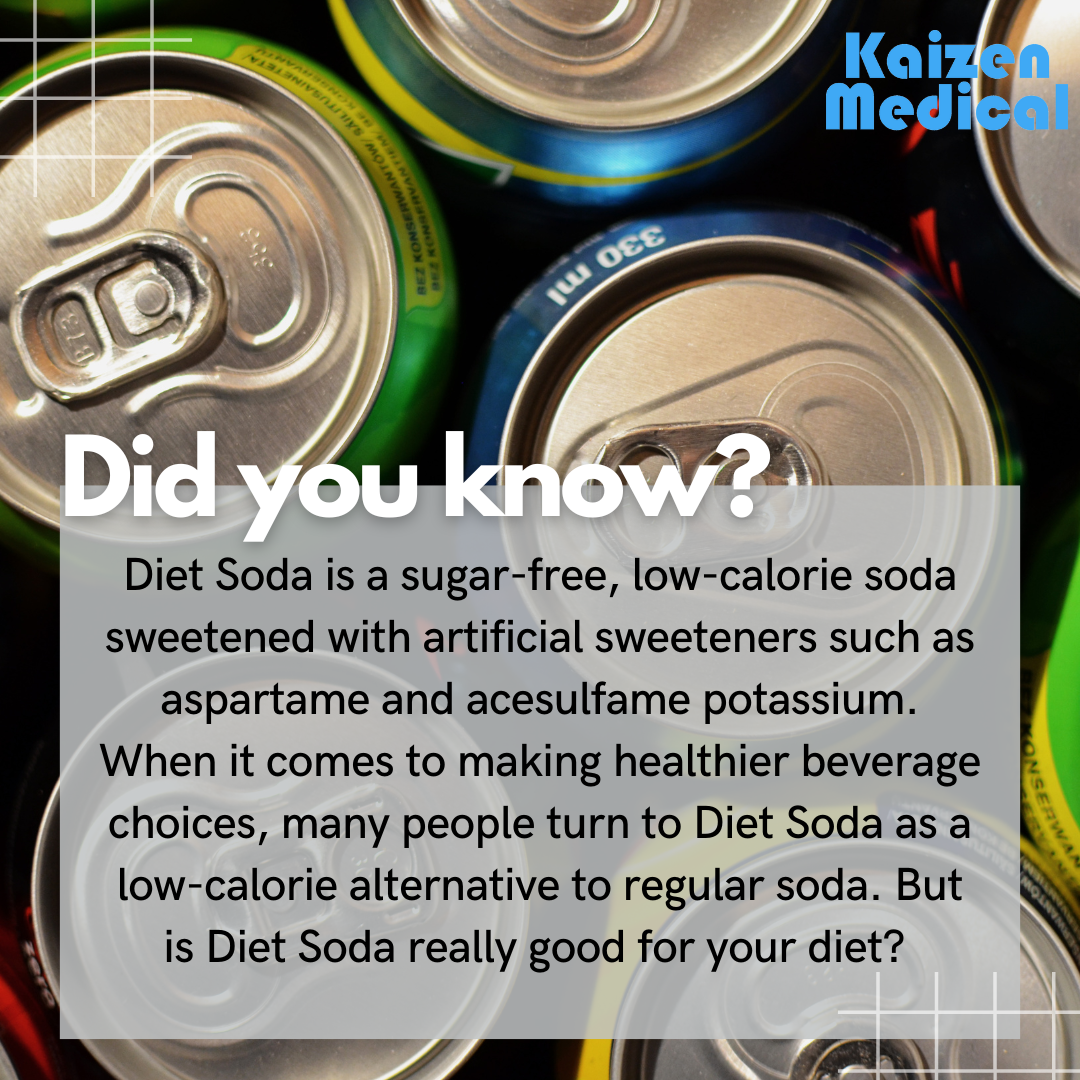When it comes to making healthier beverage choices, many people in Singapore turn to Diet Soda as a low-calorie alternative to regular soda. But is Diet Soda really good for your diet? As an internal medicine doctor, I often get asked about the benefits and potential risks associated with drinking Diet Soda. Let’s delve into the details to understand how Diet Soda can affect your health and diet.
Understanding Diet Soda
Diet Soda is a sugar-free, low-calorie soda sweetened with artificial sweeteners such as aspartame and acesulfame potassium. It was introduced as a healthier alternative to regular soft drinks, which is high in sugar and calories. The idea is that by switching to Diet Soda, you can enjoy a sweet, carbonated beverage without the added calories.
The Pros of Drinking Diet Soda
There are several reasons why people might choose Diet Soda over regular soda, including:
- Calorie Reduction: Diet Soda contains virtually no calories, making it an appealing choice for those trying to lose weight or maintain a healthy weight.
- No Sugar: Unlike regular soda, Diet Soda does not contain sugar, which can be beneficial for people managing diabetes or trying to reduce their sugar intake.[1]
- Taste Preference: Many people enjoy the taste of Diet Soda and find it a satisfying alternative to sugary beverages.
- Convenience: Diet Soda is widely available and can be a convenient low-calorie beverage option.
Potential Risks and Concerns
While Diet Soda has its benefits, it is not without potential risks and concerns. Here are some important factors to consider:
- Artificial Sweeteners: Diet Soda contains artificial sweeteners like aspartame, which have been the subject of controversy and research. Some studies suggest a potential link between artificial sweeteners and health issues such as metabolic syndrome and increased cravings for sweet foods.
- Impact on Weight Loss: Some research indicates that consuming artificial sweeteners may not lead to weight loss and might even contribute to weight gain by altering appetite regulation and increasing cravings for high-calorie foods.[2]
- Dental Health: Although Diet Soda does not contain sugar, its acidity can still contribute to tooth erosion and dental problems.
- Addiction and Overconsumption: The caffeine and sweet taste of Diet Soda can lead to habitual consumption, which might displace healthier beverage choices like water and herbal teas.
Insights from an Internal Medicine Doctor
As an internal medicine doctor in Singapore, I advise my patients to consider the following when deciding whether to include Diet Soda in their diet:
- Moderation is Key: Like any food or beverage, moderation is crucial. Occasional consumption of Diet Soda is unlikely to cause harm, but overreliance on it can lead to potential health risks.
- Read Labels Carefully: Be aware of the ingredients in Diet Soda and how they might affect your health, especially if you have underlying health conditions.
- Monitor Your Health: Pay attention to how your body responds to Diet Soda. If you notice increased cravings, digestive issues, or other adverse effects, it might be wise to reduce your intake.
- Hydrate with Water: While Diet Soda can be a low-calorie option, it should not replace water as your primary source of hydration. Aim to drink plenty of water throughout the day.
Real-Life Case Study
Consider the case of Mrs. L, a 40-year-old woman from Singapore who struggled with weight management. She switched from regular soda to Diet Soda, hoping to reduce her calorie intake. However, despite the change, she did not see significant weight loss. After consulting with her internal medicine doctor, Mrs. L learned that her increased cravings for sweet foods and snacks were linked to her Diet Soda consumption. By reducing her intake and focusing on a balanced diet with plenty of water, she eventually achieved her weight loss goals.
Frequently Asked Questions (FAQs)
- Is Diet Soda safe for everyone? While generally safe for most people, individuals with certain health conditions or sensitivities to artificial sweeteners should consult their internal medicine doctor before consuming Diet Soda.
- Can Diet Soda help with weight loss? Diet Soda can help reduce calorie intake compared to regular soda, but its impact on weight loss varies. Some people may experience increased cravings or appetite when consuming artificial sweeteners.
- Does Diet Soda affect blood sugar levels? Diet Soda does not contain sugar and generally does not raise blood sugar levels, making it a popular choice for people with diabetes. However, it’s essential to monitor how your body responds.
- Can drinking Diet Soda lead to tooth decay? While Diet Soda does not contain sugar, its acidity can contribute to tooth erosion and dental problems if consumed in excess.
- How much Diet Soda is safe to drink? Moderation is key. Occasional consumption is unlikely to cause harm, but it’s best not to rely on Diet Soda as your primary beverage.
Final Thoughts
Diet Soda can be a low-calorie alternative to sugary beverages, but it’s essential to consume it in moderation and be aware of potential health risks. As an internal medicine doctor in Singapore, I recommend focusing on a balanced diet with plenty of water and consulting with your healthcare provider if you have any concerns about including Diet Soda in your diet.
[1] https://www.hsph.harvard.edu/news/hsph-in-the-news/artificial-sweeteners-vs-sugar/
[2] https://www.ncbi.nlm.nih.gov/pmc/articles/PMC7817779/
About Dr Adrian Mondry
Dr Adrian Mondry is a Hypertension Specialist accredited by the German Hypertension League in Singapore. He was previously a senior consultant in the department of medicine at the National University Hospital and Ng Teng Fong General Hospital (NTFGH), Dr Mondry has more than 30 years of experience in the field of internal medicine.
Dr Adrian Mondry is recognised for his leadership and contributions in establishing the dedicated hypertension clinic within the National University Health System and fast-track deep vein thrombosis service at NTFGH.
Dr Adrian Mondry is fluent in English, German and French.
About Kaizen Medical
Kaizen Medical is located at Mount Elizabeth Novena Specialist Centre, Suite 11-57.
At Kaizen, we provide in depth health care to patients with multi-organs diseases; tackling undifferentiated presentations that cannot be easily assigned to a single organ.


